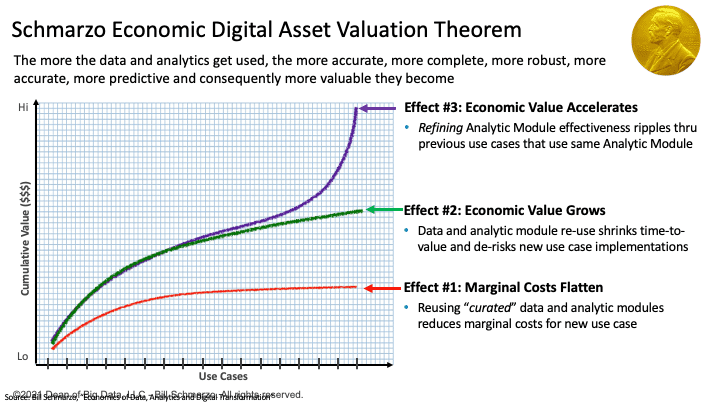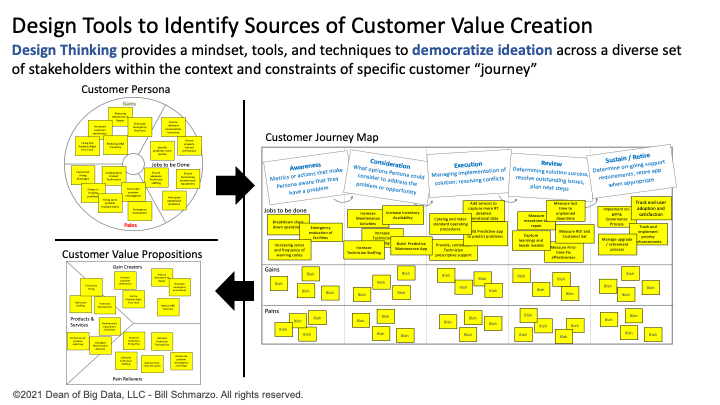
The Golden State Warriors won the 2022 National Basketball Association (NBA) title for many reasons. Having one of the top 10 players in NBA history in Steph Curry certainly helps. But other teams have top 10 / top 15 players, and they didn’t make the finals (or even get into the playoffs, in one case).
I believe that a key factor for the Warriors’ success was their lineup of 2-way players – players that excel at both the offensive and defensive ends of the court. Golden State 2-way stars such as Andrew Wiggins, Klay Thompson, and Steph Curry give the Warriors more offensive and defensive options. And since basketball is a game of creating mismatches, it is exponentially easier to create mismatches when you have multiple 2-way players on the court.
So, other than finding a way to write about my favorite basketball team, what does the concept of 2-way players have to do with Chief Data Officers (CDOs)? Because like the world champion Golden State Warriors, a world champion CDO also possesses critical 2-way skills:
- Economics, which is understanding both how the organization creates value and how identifying the KPIs and metrics of that value creates effectiveness.
- Design Thinking, which is about empowering everyone in the organization to ideate where and how data and analytics might be deployed to derive new sources of customer, product, service, and operational value.
Note: I’m assuming that every CDO possesses the base skills of data science and data management. Those are the tickets for just getting entry into the CDO arena.
A world champion CDO’s primary business focus is value creation. World champion CDOs focus on creating value by applying data and analytics to optimize key business processes, mitigate compliance and regulatory risk, uncover new sources of revenue, and create more compelling customer experiences.
Let’s drill into these two skills of economics and design thinking and identify what you need to do to become the Steph Curry of CDOs (4 rings and counting, baby!).
CDO 2-way Skill #1: Master Economics and Value Creation
Economics is the branch of knowledge concerned with the production, consumption, and transfer of wealth or value.
World champion CDOs are strategic partners to the Line of Business executives. World champion CDO’s help their business counterparts leverage data and analytics to power their key business and operational use cases (e.g., reduce customer attrition, improve customer acquisition, reduce unplanned operational downtime, reduce inventory costs, improve 4-year graduation rates, reduce hospital-acquired infections, reduce rainforest and coral reef shrinkage).
Key Data Economic concepts that our world champion CDO needs to understand, and master, include (Figure 1):
- Data Economic Multiplier Effect is the economic ramifications of the accumulation of attributable and quantifiable value from the application or use of a data set against business and operational use cases.
- Nanoeconomics is the economic theory of individual entity (human or device) predicted behavioral and performance propensities,
- Analytic Profiles are key-value data stores that capture, codify, share, re-use, and continuously refine the predicted behavioral and performance propensities in the form of analytic scores for the organization’s individual human and device entities.
- Appreciating Economic Assets leverage AI / ML to appreciate in value, not depreciate in value, the more that the assets are used.

Figure 1: Key Data Economic Concepts (useful homework slide)
These data economic concepts come together to enable the Schmarzo Economic Digital Asset Valuation Theorem, which formulates the economic value of data and analytics (Figure 2).

Figure 2: Schmarzo Economic Digital Asset Valuation Theorem
The Schmarzo Economic Digital Asset Valuation Theorem highlights three effects that result from sharing, reusing, and continuously refining the organization’s data and analytic assets on a use case-by-use basis:
- Effect #1: Marginal Costs Flatten. Sharing and reusing “curated” data and analytic assets reduces the marginal costs in application against new use cases.
- Effect #2: Economic Value Grows. Reusing data and analytic assets shrinks time-to-value and de-risks new use case implementations.
- Effect #3: Economic Value Accelerates. Refining data and analytic asset effectiveness ripples through the previous use cases that use the same data and analytic assets.
CDO 2-way Skill #2: Master Design Thinking and Employee Empowerment
Design Thinking is all about understanding and empathizing with your customers, understanding their points of view and intentions, mapping their journeys, and ultimately telling their stories.
Design Thinking is critical in identifying, validating, valuing, and prioritizing your customers’ sources of value realization. That includes understanding their intentions, desired outcomes, the KPIs and metrics against which your customers will measure their progress and success, and the gains (benefits) and pains (impediments) experienced along their journey.
Customer Journey Maps, Personas, and Customer Value Propositions are great design tools for identifying and validating your customers’ sources of value creation (Figure 3).

Figure 3: Design Thinking Customer Intimacy Tools
But more than just identifying the sources of customer value creation, design thinking concepts and techniques can also be used to empower your employees to ideate where and how data and analytics can accelerate customer differentiation, optimize operational efficiency, and even reinvent business and operational processes.
Design Thinking is also about empowering everyone in the organization with the necessary skills, tools, responsibility, authority, and freedom to co-create new sources of value with their customers and stakeholders (Figure 4).

Figure 4: Design Thinking Can Empower and Democratize Ideation
Summary: World Champion CDO are 2-way Players
Besides an indisputable understanding of data science and data management, world champion CDO’s exhibit superior 2-way skills in the areas of economics (identifying where and how to apply data and analytics to create new sources of customer, product, service, and operational value) and design thinking (to empower everyone in the organization to ideate, experiment, and learn where and how data and analytics can be applied at the frontlines of customer engagement and operational execution).
Organizations seeking to become world champions realize they must become more effective at leveraging data and analytics to power their business models. And a world champion CDO who possesses the 2-way skills of economics and design thinking is the indisputable star of the game. Watch out Steph Curry; here comes world champion CDO’s!
